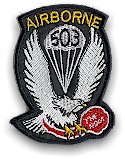|
Few of us who were seniors at Dartmouth College in 1940 were much
concerned about war. That was something on the other side of the
Atlantic. Germany had attacked Poland and France and England. It had
little to do with us. There was no television and our only sources of
information were radio and newspapers. We were involved with our studies
and sports and looking forward to graduation in June and finding a job.
Because I had majored in English and spent a summer as a cub reporter for
The Greenwich Time in Connecticut I looked first for a writing position,
starting with Life magazine, where I talked with the editor. He seemed
more interested in what was going on in Europe than in American affairs.
He did not offer me a job.
Next I tried the Associated Press and, for reasons I have forgotten,
didn't take the job offered. Eventually I went to work in my home town of
Worcester as a sales engineering trainee for the Norton Co., a large
manufacturer of grinding machines and grinding wheels. For $75 a week,
good pay then, I spent time in each department, learning the manufacturing
process, and writing a report on what I had learned.
Early fall merged into winter. I spent some free time skiing on a nearby
hill and very little time wondering about either my career or events in
Europe.
That changed in early 1941. The nation had passed a draft law and on March
1, I reported to a large building, along with several hundred other young
men. We stripped and lined up for physical examinations. I remember being
somewhat shocked at the poor appearance of many of my fellow draftees.
They didn't look like athletes — and they were not. Some were skinny, some
a bit twisted, some unhealthy looking. They were of several nationalities,
as one would expect in New England; lots of Italians and middle-eastern
countries. Maybe that was why one of the doctors examining me said, "Boy,
you're in the army." One doctor did find a defect in my body. He remarked
to another that I had ‘pes planus moderatus’. Thanks to four years of
Latin I knew he said I had slightly flat feet.
A few days later those of us who had passed the examination boarded a
train for Camp Edwards on Cape Cod. Four of us who thought we were
superior specimens of young manhood sat together and played bridge, hiding
our fears and uncertainty behind jokes and idle talk. When we pulled into
the camp we were greeted by shouting soldiers who hurried us into some
form of order and marched us off to draw uniforms and be assigned to
barracks. I remember that one of my fellow draftees asked why the soldiers
had to yell angrily at us to get us in formation. We found out later; that
was the army.
Perhaps 40 or 50 of us were assigned to Service Co., joining regular
National Guard soldiers who had been mobilized some months earlier. This
was a new world, one of discipline and commands and learning, everything
from how to make a bed to close order drill. For the first three months we
were free of regular duties like kitchen police and the driving of trucks.
We were learning to be soldiers, days and days of rifle instruction, dry
firing, basic sanitation, close order drill, long marches. A never-ending
series of new experiences.
Perhaps because I was one of the few recent college graduates among my
fellow draftees I was sometimes called upon for special activities. I was
one of a small group taking classes in military intelligence. In
preparation for the regiment's eventual travel somewhere, I gave a slide
lecture on the loading of vehicles on railroad cars -- a subject about
which I knew only what I read in a manual. I even found myself an acting
noncom, marching small groups to functions or directing skirmish training,
again something about which I knew little.
Came the fall of 1941. Our basic training was over. We were doing all the
normal jobs in the company -- driving trucks, dumping garbage, delivering
supplies. Our leaders even made me the company guidon bearer, a function
performed only in parade and requiring only the ability to hold aloft a
small flag and dip it when required. Even so, I must have done something
wrong, because shortly after a regimental parade, my captain was chewed
out by the colonel. Since he was a kindly gentleman, he never told me the
nature of my error.
|





